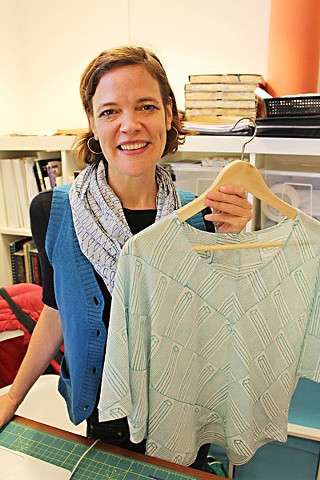The Good Eye
Rekh & Datta's 'slow clothing' line takes its time going from Texas to Rajasthan and back again
By Amy Gentry, Fri., Dec. 20, 2013
The Rekh & Datta studio is an organized riot of color and pattern. Fabrics in abstract patterns resembling elongated crystals and deconstructed cubes cover every surface and dangle in hankie-sized scraps from the bulletin board, while cotton dresses in spidery geometric prints sway lightly on their hangers.
If founder Rebecca Layton's Kickstarter campaign succeeds (it closes Jan. 10), these hand-printed clothing and housewares will become available in Austin in 2014.
Let's hope that happens, because the textiles Layton designs, commissions, and wears – around her neck, on the day we met in her studio on East Cesar Chavez, in the form of a graceful infinity scarf – are completely unique. Layton's crisp, modern designs, many of them inspired by India's rapidly industrializing landscape, acquire a softness, almost an intimacy, when rendered in the traditional Indian block-printing technique after which the studio is named. Moreover, by working directly with small, often family-owned print shops in Jaipur to execute her designs, Layton carries out her commitment to a "slow clothing" movement that favors sustainable materials, high quality, and fair wages for skilled artisan labor.
And, oh yeah – her Western shirts are killer.
Layton first visited Jaipur in the Indian state of Rajasthan, famous for its textiles, in 2005. As a masters student in combined media at Hunter College of CUNY, she had studied the history of wallpaper, and was intrigued by the intricate designs and the precision of the centuries-old hand-stamping technique. Returning to India on a Fulbright, Layton studied the craft alongside the printers themselves, staying an extra year to teach art at an Indian school and suffering a bout of typhoid that almost killed her. When Layton came back to the States, she knew she wanted to bring her designs to a larger audience, while at the same time raising Westerners' awareness of the ancient skill.
The technique, historically confined to the men of a particular Muslim caste (although, according to Layton, more women are beginning to learn), uses hand-carved wooden blocks with a handle on the back, like a stamp. Rekh & Datta is named after the two types of blocks used: first the "rekh" block establishes the line of the pattern, then the "datta" block adds the color.
"The carving of the block is an art form in and of itself," Layton says, turning one of them over in her hands. "The technical know-how really has to be passed down from father to son. They start when they're about 6 years old, and they do these little practice ones and sell them to tourists." She gestures toward a rough block of wood with a bird design carved into the side.
At the printing tables, the blocks are carefully pressed onto a long bolt of fabric and pounded to set the dye. Traditional patterns can have up to 10 colors, which means that a single meter of fabric can take as many as 1,000 prints. "They have these incredible muscles right here from pounding," Layton says, touching the base of her thumb.
Although many large stores like Anthropologie and West Elm use Rajasthani block-printed textiles, they typically conduct their business through middlemen and work in huge batches sometimes ill-suited to the precise work. "They're going to some fancy showroom, and the work's getting farmed out to these print farms," says Layton. "I've seen some print shops where the inks they're using are toxic, and the conditions are gross." Layton's close partnership with the printers, though occasionally complicated by her gender and the language barrier, prevents this scenario; having clocked time at the printing tables herself, she sees them as fellow "makers."
Moreover, the garments created by Layton's collaborator, Polish designer Monika Jakubiak, are impeccably sewn and refreshingly free of the trendiness of many such mass-produced designs. Simple, classic shift dresses, Western shirts, knickers, and boxy, bias-cut tops showcase the lightweight Indian cotton, using the direction of the prints and playing patterns off one another in plackets, yokes, pocket linings, and bindings. The finishing-work on the garments is as precise as the prints, with smooth French seams and delicate, billowy hand pleats. Perfect summer clothes for Texas – and Layton promises that all Kickstarter rewards (I'm looking at you, cowl-neck tee) will be delivered by summer, with gift cards available for the holidays.
The Dallas-born artist points out that Rajasthan has more in common with Texas than you might think. "There's a kind of cowboy culture there," she says. "They have turbans, but they're still cowboys."
See austinchronicle.com/photos for a photo gallery of the Rekh & Datta design studio.









